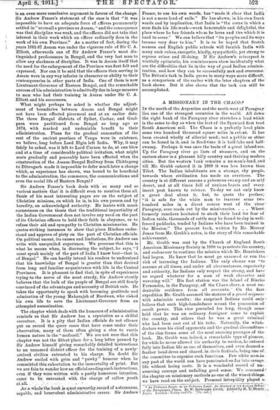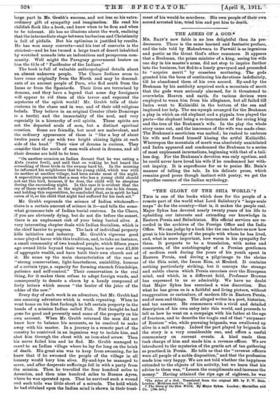A MISSIONARY . IN THE ClIACO.f.
IN the north Of the Argentine and the north-west of -Paragu" ay lies one of the strangest countries in the world. All down. the right bank of the.Paraguay river stretches a land which is the same to-day as when the foot of the Spaniard first trod South American- soil. The Chaco is a perfectly level- plain some two hundred thousand square -miles in extent. It has been created wholly of alluvialtnad;•not a pebble or steins. can be found in it, and in flood-time it is half-lake and half- swamp.. Perhaps it was once the basin of a great inland sea. Up the Paraguay river go lines :of steamers, and on the eastern shoreis it pleasant hilly country and thriving modern cities. But the western tank- remains a no-man's-land, and till Mr. Grubb entered it in 1889 it was lees Immix than Tibet. The Indian inhabitants are a strange, shy people, towards whom civilisation has made no overtures. The country is at different seasons a poisonous swamp and an arid' desert, and at all times full Of noxious beasts and every . insect -pest known to science. To-day we not only knew . a great deal about it,- hut, to qilote the preface; "it is safe for the white man to traverse some two hundred miles in a direct coarse west of the river • Paraguay, over roads cut by the missionaries. . . . Where. formerly ranchers hesitated to stock their land for fear of Indian raids, thousands of cattle may be found to-day in well.. fenced paddocks, tended by Indians who have been trained in the Mission." The present book, written by Mr. Morrey' Jones from Mr. Grubb's notes, is the story of this remarkable achievement.
Mr. Grubb was sent by the Church of England South American Missionary Society in 1890 to penetrate the country,' and endeavour to continue the mission which Mr. Henricksen had begun. He knew that he. must go unarmed or run the * risk of incensing the Indians. The only chance was ".to assume at all times, and. under all *circumstances, superiority and authority, for Indians only respect the strong, and heete no regard whatever for a man of weak distracter Ana.. wavering will." His first-station was the Island of Hisao-. Fernandez, in the Paraguay, off the. Chaco. shore, a most un- desirable residence from all accounts. -On the first... expedition Mr. Grubb assumed the manner Of a grand seigneur with admirable results: • the -surprised Indians could only. believe that such high-handedness meant the possession:of.. occult power. This view prevailed for long, though some:' held that he was an ordinary, .foreigner come to exploit- the country, and others that he was a. great criminal. who had been cast out of his- tribe. Naturally, the witch., doctors were his chief opponents and the gradual discomfiture .* of the clan forms some of the most amusing passages of the. book. Mr. Grubb was; indeed, a remarkable type of pioneer, for whilehe never allowed his' authority to weaken, he entered . fully into Indian life as one of themselves, and even donnexl:a •- feather head-dress and shared.,in. their, festivals, being,tine of the committee to organise such functions. Few white men-in any part of the world can have penetrated-so far into-savage . life without losing caste. It is a• wonderful record of un- swerving courage and unfailing good senses- We. eommend-'. the chapter on missionary methods as one of: the ivisest things. we have read on the subject`- Peraonal intrepidity played. OJ • An linknoun People in an Unknown Land : An'Aeonint "thiLengtialtritiftn.— of Ake. _Paraguayan rhqco. . By W; B4rtgoctim oho,- gmtediby Vgnirgy, Jones. London :"Veeley and CO. tics. act.] - ' •
large part in Mr. Grabb's success, and not less so hie extra- ordinary gift of sympathy and imagination; He read his childish flock like a book, and knew when to be firm and when to be tolerant. Ile has no illusions about the work, realising that the intermediate stage between barbarism and Christianity is full of pitfalls. But his optimism is justified by results. He has won many converts—and his test of converts is the strictest—and he has turned a large tract of desert inhabited by wretched nomads into an industrious and prosperous com- munity. Well might the Paraguay government bestow on him the title of " Pacificator of the Indians."
The book is full of valuable anthropological details about an. almost unknown people. The Chaco Indians seem to have come originally from the North and may be descend- ants of an ancient people of Peru, who fled south from the Incas or from the Spaniards. Their lives are terrorised by demons, and they have a legend that some day foreigners will appear to rid them of this terror -and expound the mysteries of the spirit world! Mr. Grubb tells of their customs in the chase and in war, and of their odd- religious beliefs. They believe in an original Creator (their Demiurge is a beetle) and the immortality of the soul, and very especially in a hierarchy of evil spirits. These spirits are not the departed souls of men, but a distinct spiritual -creation. Some are friendly, but most are malevolent, and the ordinary appearance of these is "like a boy of about twelve years of age with two bright shining lights at each side of the head." Their view of dreams is curious. They consider that the souls of men walk about in dreams, and all their dreams are held to be true.
"On another occasion an Indian dreamt that he was eating a Sate (water fowl), and said that on waking he had heard the screeching of these birds in the swamp hard by. In the morning he informed his neighbours that his young child, which was with its mother at another village, had been awake most of the night. A superstition prevails that a man who has a young child should not eat this bird, because, if he does, the child will be sleepless during the succeeding night. In this case it is evident that the cry of these waterfowl in the night had given rise to hie dream, and holding this superstition, he concluded that, as in spirit he had eaten of it, so his child that night had suffered for his rash act."
Mr. Grubb expounds the science of Indian witchcraft— there is a certain amount of science in it—and tells the some-
-what gruesome tale of Indian burial customs. In the Chaco, if you are obviously dying, but do not die before the sunset, there is an unpleasant risk of your being buried alive. A very interesting chapter deals with Indian Socialism, which is the chief barrier to progress. The lack of individual property kills initiative and industry. Mr. Grubb's vigorous good sense played havoc with this tradition, and, to take an instance, a small community of two hundred people, which fifteen years ago owned little beyond their weapons, have now over £1,000 of aggregate wealth, and have built their• own church out of it. He sums up the main characteristics of the race as "strong conservatism, light-heartedness, amiability, humour of a certain type, a capacity for forming staunch friendships, patience and self-controL" Their conservatism is the real thing, for it makes them refuse to adopt foreign words, and consequently to denote a churn by a handy compound of forty letters which means "the beater of the juice of the udder of the cow."
Every day of such work is an adventure, but Mr. Grubb had one amazing adventure which is worth repeating. When he went home on his first furlough he left certain property in the hands of a mission Indian called Poit. Poit thought he had gone for good and presently used some of the property on his own account. When Mr. Grubb returned the man did not know how to balance his accounts, so be resolved to make away with his master. In a journey in a remote part of the country he contrived in an ingenious way to isolate him, and shot him through the chest with an iron-shod arrow. Then his nerve failed him and he fled. Mr. Grubb managed to crawl to an Indian village where he lay for long on the brink of death. His great aim was to keep from swooning, for he knew that if he swooned the people of the village in all honesty would bury him alive. By-and-bye he managed to move, and after desperate sufferings fell in with a party from the mission. Then he travelled the four hundred miles to Asuncion, and then nine hundred miles to Buenos Ayres, where he was operated upon. That he survived such a wound and such toils was little short of a miracle. The hold which he had obtained upon the Indian mind is shown in their treat-
ment of his would-be murderer. His own people of -their own accord arrested him, tried him and put him to death.











































 Previous page
Previous page